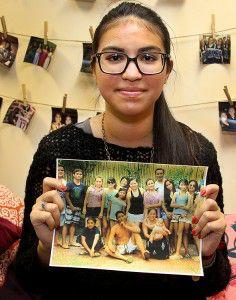
Residents of the Philippines are struggling to recover from the devastation caused by Typhoon Haiyan, including the families of some Filipino students at Boston University.
Alana Schwartz, a College of Communication freshman, said her uncle’s home on Mindoro Island, a province largely affected by the typhoon two weeks ago, was decimated.
“His whole house was destroyed, and so was everybody else’s in his province,” Schwartz said.
Her uncle survived the destruction by digging an underground refuge, she said.
“They went underground and just dug,” she said. “They stayed there for over 24 hours. He has nothing left except for a few documents that they took down. There’s no running water, no resources — nothing left.”
College of Arts and Sciences professor of international relations and Earth and environment Adil Najam said Typhoon Haiyan is one of the worst natural disasters in recorded history, and the Philippines will struggle with recovery for many generations.
“We have yet another great tragedy unfolding in the Philippines,” Najam said. “We’ve seen a whole bunch of them all over the world now, not just in that region, but certainly a lot in that region. We have this massive typhoon, and now we have the human tragedy that’s always left behind, which is people that are homeless, people who need assistance, people who need water.”
Although the economic destruction of the typhoon is overwhelming to the already impoverished nation, Najam said the most important area of focus is the human loss aspect.
“Economic terms … might actually have a large number attached to it, but the real loss is in terms of human life, human displacement and that you really can’t put a number on,” he said. “That’s the problem when tragedies hit places that are occupied by the poorest people. Economic costs in a simple measure can be a distraction and are not a picture of what has really happened.”
Countries across the world have reached out to provide aid to the Philippines as it tries to rebuild, Najam said. The problem is that many people often forget one disaster once another one strikes. He also said people should not compare the typhoon to previous or future natural disasters.
“There should be a difference between football and human tragedy,” Najam said. “You don’t pick winners and talk about largest and smallest and ‘is this bigger or smaller than the other?’ A dead child is a dead child, and a dead child is a great tragedy.”
A student who asked to remain anonymous said although her family did not live in the affected region, they owned land there. One of her family members, whose whereabouts are currently unknown, was surveying his land in Tacloban when the typhoon struck.
“In terms of everyday lives, they [the student’s family] are okay,” she said. “It’s just now they have that extra factor of trying to find where our lost family member might be. Their home is fine, where everyone is now is fine. It’s just that one family member we’re worried about. We didn’t know he was gone. I didn’t know. I haven’t been in contact with him.”
Chot Duay, a CAS and School of Management junior and Philippines native, said although the tragedy in his homeland is overwhelming, he sees the recovery as a chance for people to see the resilient spirit of the Filipino people.
“It’s a chance for BU to see how united the Philippines can be,” Duay said. “… I’d like for people to someday visit and see the Philippines when it’s a little sunnier and a little happier. Don’t let this disaster be what you see the Philippines as.”
Duay also urged students to reach out to the country with aid and to remember the country for its environment, and most of all, its people.
“The Philippines needs the help right now, most definitely, but I really hope they remember us for who we are and what we are as a people and as a country,” Duay said. “It’s a beautiful country and we are a beautiful people.”






















































































































